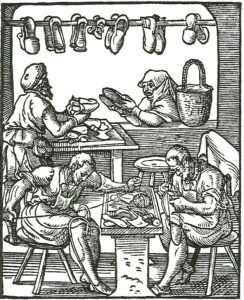
“One of the earliest occupations of our ancestors was that of treating raw skins into leather…Most English villages had at least one leatherworker. As early as the 14th Century men were involved in the occupations of skinners, were makers of footwear, saddles, bottles, purses, bags, pouches, gloves and other article made from leather.”
By Myra Vanderpool Gormley, CG
Copyright © 1988, 2005—All rights reserved
Do not post or publish without written permission
Our family did not consciously choose our family names. Hereditary surnames came into being primarily because the eternal tax collectors needed a way to identify people.
Almost all of our surnames were in existence before the beginning of the 15th Century and most of our names were placidly accepted as those our ancestors were known by in the village where they lived.
Tracing your family name back through the centuries—and its spelling will vary greatly will probably take you to the early 1400s, if you’re lucky. That research can take you through nearly 500 years of record (no small feat), but few of us, unless we have noble or royal ancestors will get beyond this date.
Some of our American surnames have roots in English occupations—one of those being the leather industry.
Man has been using skins for clothing and shelter as far back as prehistoric times. One of the earliest occupations of our ancestors was that of treating raw skins into leather.
The Egyptians and others made leather saddles, shields and bottles. The Romans and Greeks produced leather, and it was the Romans who are credited with teaching most of Western Europe the craft of tanning. In the Roman ruins in Great Britain have been found soles of old Roman sandals.
Prior to the late 19th Century hides had to be soaked in water for an entire year before the tanning of the leather could begin. In medieval England, tanning of leather was an early craft. It predated the Norman Conquest. Most English villages had at least one leatherworker. As early as the 14th Century men were involved in the occupations of skinners, were makers of footwear, saddles, bottles, purses, bags, pouches, gloves and other article made from leather.
Some of the surnames we bear today derive form ancestors whose occupations were part of the leather industry in early England.
A Codman usually simply mean a leatherworker. Belter was a man who made belts— direct from the Old English word belt. A Bottler, Bottell or Bottle were those who made leather bottles and earlier variation of the surname—from the Middle English—were Bouch, Buche and Budge.
Saddlemakers spawned many surnames. The earliest English recording of a family name deriving from this occupation is Simon le Sadeler in 1288. Another spelling was Sadelare. The Old English word was sadol, which meant saddle.
Those who made the saddletree gave us surnames from the Old French fustier. These surnames are Fewster, Foister, Foyster and Fuster.
In the early Middle Ages glove makers were called upon to make a glove to protect the left hand of gentlemen involved in a falconry—a popular sport of the time. From this craft have come the surnames of Gant, Gaunt, Glouer and Clover.
Those who made lather bags produced the surnames of Belger, Bolgar, Burser, Purse and Purser.
Shoemakers—of which there were many—provided us with many of our surnames: Shoemaker, Shoemake, Schoemaker, being the easily recognized ones. But the surnames of Bootman, Coade, Cordon, Corwin, Patten, Sutter, Specker and Le Sueur all have roots in the shoemaking occupation.
If your ancestors made leather purses, bags, pouches or sacks you may still carry this ancestral surname. These include: Bagder, Baggs, Pocheler, Poghwebbe, Pocketts, Sach, Sack, and Satchell.
Those who produced rawhide were called Skinner, Shinner, Pelter, Pelly, Felmonger, Feller and Fell. Leathermakers were also known as Barker, Berker, Currier, Tanner, Tower, Whittear, and Whittier.
If your ancestor was a worker in kidskin you may have inherited the surname of Cheverall, Chevrill or Chivrall.
Two good references to the origin and variant spelling of the English surnames are: A Dictionary of English and Welsh Surnames by Charles Wareing Bardsley and The Penguin Dictionary of Surnames by Basil Cottle. See Dictionary of American Family Names (three volumes), edited by Patrick Hanks (Oxford, New York: Oxford University Press, 2003) for surname sources, origins and meanings.
To learn more about English first names consult The Oxford Dictionary of English Christian Names, by E. C. Withycombe. It was published in the U. S. by Oxford University Press.
